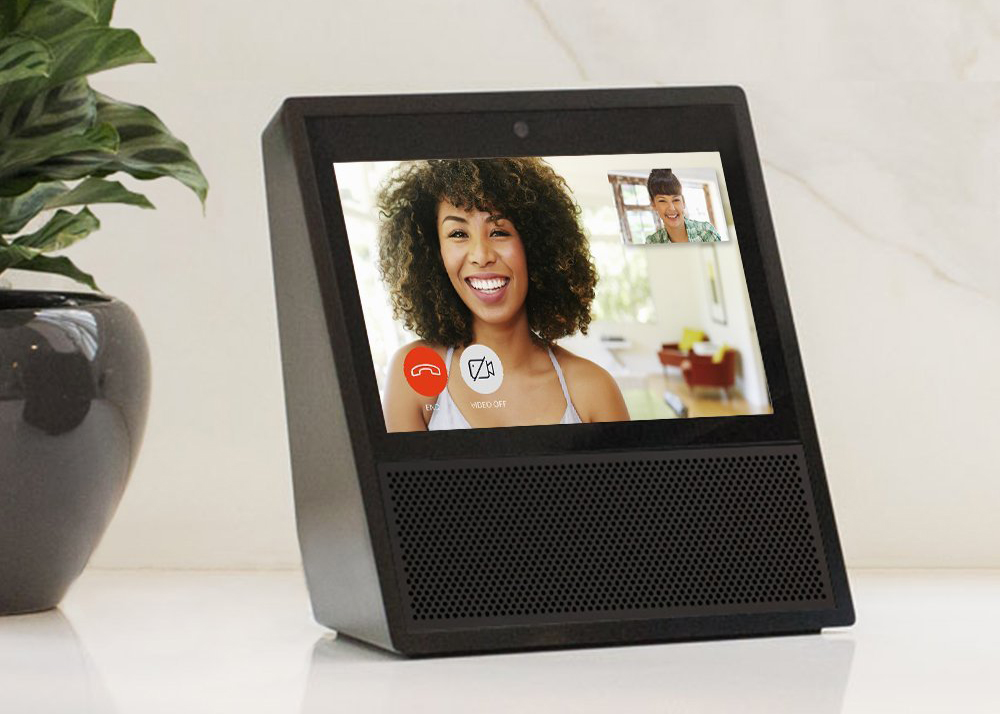A couple of hours after Amazon announced the new Echo Show, a touchscreen communication device powered by the company’s AI voice assistant Alexa, I got an email from a PR firm representing a company called Nucleus. The subject was salacious: “Amazon is out for blood – the Echo Show is proof.” I almost never reply to these emails, but the story this one told intrigued me.
The Nucleus sure does look an awful lot like the new Echo Show (Image: Nucleus)
The Nucleus email states, “Last August, Nucleus launched the first Alexa-enabled touchscreen device for audio/video communication in and away from the home, and in September, announced its Series A round, led by The Alexa Fund.” The Alexa Fund is a venture capital fund, operated by Amazon and founded in 2015, that invests money in companies — 23 companies at the time of this post — that build gadgets that will integrate with Alexa. Nucleus raised $US5.6 million ($7.6 million) in its Series A round, though it isn’t clear how much came from the Alexa Fund.
During a phone call with Nucleus CEO Jonathan Frankel, I asked Frankel if he was accusing Amazon of ripping off his product. Frankel confirmed.
“The story about Amazon coming in and stealing our idea is true,” Frankel claims.
Amazon’s response to this allegation was both predictable and reasonable. The company has been working on the Echo Show for some 18 to 24 months. And anyway, its endgame isn’t to crush startups but rather to work with them.
“We didn’t get the idea for Echo Show from Nucleus,” an Amazon spokesperson told Gizmodo. “Alexa is already on screens — Fire TV and Fire Tablets. We’re always thinking of what will benefit our customers. We know our customers love to have choice in form factors, and that’s a goal of ours on the Alexa team.”
But this scuffle does make Amazon seem like a bit of a bully. Frankel said that in the weeks and months after the Alexa Fund investment, Nucleus conducted “daily conference calls” with Amazon to discuss its product and the Alexa integration. He seems suspicious that Amazon took ideas from his team and applied them to the development of the Echo Show, which is now a competing product.
“[Amazon], of course, as an investor had access to our road map and knew what features we were building and were planning on building,” Frankel said. “We’ve known for a while that they were building a screen-based Echo. We didn’t know until [Tuesday] morning how directly competitive it would be.”
When Amazon and Nucleus were talking about the touchscreen Echo, Frankel claims, Amazon never framed it as a communication device. The Nucleus gadget’s primary feature is that it offers easy ways to communicate with family members. It’s essentially a video intercom that works over Wi-Fi with a few extra features built in thanks to the Alexa integration.

Amazon is absolutely marketing the Echo Show as a communication device. (Image: Amazon)
The Echo Show is absolutely being marketed as a way to communicate with friends and family, sure, but one could easily claim that the basic communication feature is pretty obvious — Microsoft’s newly announced Invoke speaker has Skype calling built in, for example. The similarities between the Nucleus product and the Echo Show run deeper. In particular, Amazon’s “Drop In” feature that lets you check in on grandma (or whatever) without her actually needing to answer the video call bears marked resembles to the “Auto Answer” feature Nucleus launched long ago.
“My jaw dropped when I saw [Drop In],” Frankel said. “Auto Answer has been our defining feature since day one. The ability to connect instantly with your immediate family — that’s the main difference between us and Skype.”
This sure sucks for Nucleus, but is Amazon doing anything illegal? When I pressed Frankel on this issue, he deflected and gave me a long speech about how Amazon’s treatment of his company should make other startups and telecom companies very scared. He wouldn’t say if Amazon actually stole any Nucleus intellectual property or violated any patents. For the most part, Frankel just seemed pissed off that Amazon would so brazenly turn its back on a company that used to be a close partner. And obviously, he said, developers should think twice before taking money from the Alexa Fund to build new products.
When I asked Frankel if his company planned to take legal action against Amazon, Frankel wouldn’t say for sure. “Everything is on the table,” he said. “Our preferred approach would be to partner with other companies that are a threat to Amazon.”
Amazon said it would like to keep working with Nucleus and any other developer that wants to build on top of the Alexa platform. The Amazon spokesperson explained that the Echo ecosystem isn’t designed to help Amazon-branded products fill every home in America. (I’m also guessing Jeff Bezos would not be disappointed with this outcome.)
“We think the Nucleus product is very complimentary to Echo Show — it’s thinner and can be mounted on the wall and serves a complimentary purpose in the home,” the Amazon spokesperson told me. “Finally, we are working hard to bring all Alexa capabilities, including calling and messaging, to [Alexa-enabled] devices like Nucleus. We think Nucleus devices can be great endpoints for Alexa communications.”
To sum up that clunky quote, Amazon is actually suggesting that Nucleus should actually be excited about the Echo Show. Sure, it’s incredibly similar to the gadget Nucleus is selling, but maybe somebody (anybody?) will want to buy both.
From afar, this appears to be a real “tough luck” situation for Frankel and Nucleus. The startup took money from a huge internet giant and shared secrets with its developers. It’s hardly surprising that Amazon ended up integrating some similar features in a competing product of its own. We don’t know for sure whether Amazon got these ideas from those meetings with Nucleus, but the controversy is undeniable.
This happens all the time in Silicon Valley and beyond. Just look at Snapchat’s accusing Facebook of allegedly stealing its main features, or Google’s legal feud with Uber over the alleged theft of self-driving car secrets. Companies will take every opportunity to exploit another’s weakness, and it’s always hard to figure which accusation is based on truth and which are based outrage.
It’s gross, sure. It’s also a tradition at this point.
